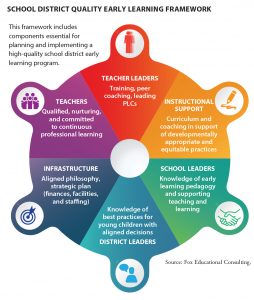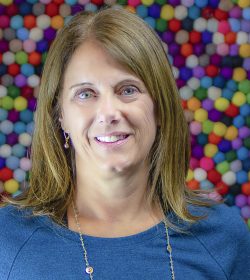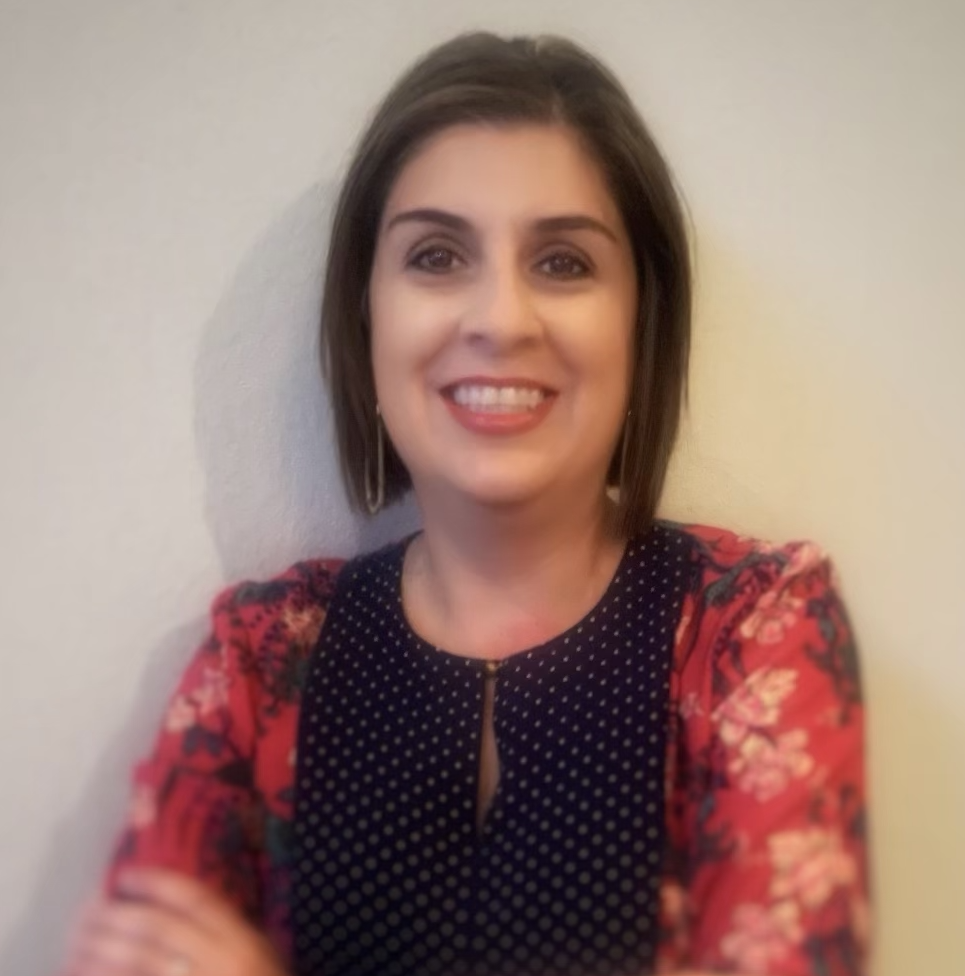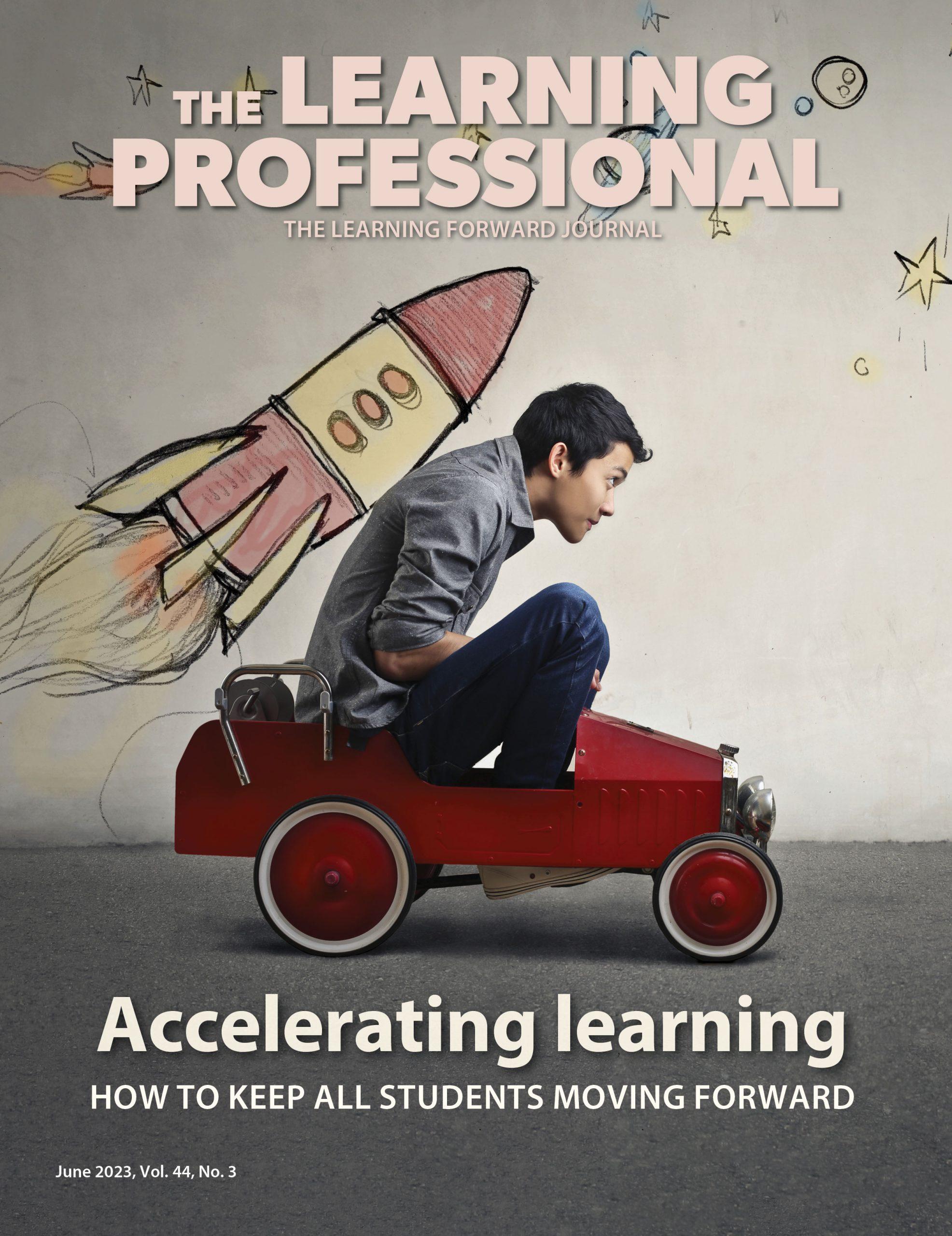FOCUS
Texas district learns the building blocks of pre-K
By Betsy Fox, Irma Jean Gaona and Larrisa Wilkinson
Categories: Change management, Collaboration, Early education, Implementation, Leadership, Learning communities, Learning systems/planning, System leadershipApril 2021
Picture a noisy room full of elementary principals building towers with play dough, straws, and toothpicks while laughing, talking, and sharing ideas — and competitively checking the progress of other table groups. In a yearlong program with school and district leaders from East Central ISD in San Antonio, Texas, we begin with this activity to engage principals in understanding how playing to learn supports social and academic development of young children.
This is just one of the components of our district’s early childhood professional learning system, which is part of our overall early learning quality improvement process. We support elementary principals in early learning pedagogy so they can better support quality instruction in district programs serving 4- to 5-year-olds. We believe the impact on teacher practice is much deeper with the knowledgeable support of school leaders.
In this #LearnFwdTLP article, learn how a Texas district supports elementary principals in early learning pedagogy so they can better support quality instruction. Click To TweetStates and local communities are increasing access to preschool, but there is a significant divide when it comes to the quality of these early learning programs. Education and training requirements for preschool educators vary based on setting and state regulations, and while districts and nonprofits may offer professional learning, effective job-embedded coaching and school-based leadership support are rare.
Teaching our youngest learners well requires a unique pedagogy. Children are arriving at preschool with a wide range of developmental abilities and a small but critical window in which to become ready for kindergarten.
Developmentally appropriate and culturally relevant teaching and learning practices set the stage for ensuring that learning experiences are suited to each child’s developmental level. The ultimate goal of our district’s early childhood professional learning is that educators understand and implement specific strategies that support each child’s development across cognitive, language, social-emotional, and physical domains.
To accomplish this, San Antonio’s East Central ISD partnered with Pre-K 4 SA, a local tax-funded workforce development initiative whose mission is to improve San Antonio’s workforce in one generation by changing the educational trajectory of 4-year-olds across the city. In addition to directly serving 2,000 children, Pre-K 4 SA provides over 10,000 hours of high-quality professional learning to 2,000 early educators in public and private settings across the city annually.
Through this partnership, the district expanded its program to include pre-K classrooms on every elementary campus for a total of 24 classrooms. Just as importantly, East Central ISD receives grant-funded support for curriculum implementation and educator professional learning.
All of this means that our district’s pre-K educators, and the leaders who support and oversee them, have greater opportunities to learn, share, question, and grow to provide the strongest pre-K program possible.
Choosing a curriculum
Knowing that Pre-K 4 SA would support professional learning and implementation for a curriculum that promotes active learning through play, we implemented HighScope, a preschool curriculum that guides children to explore and interact through purposeful play. It was a radical shift from a more traditional curriculum.
Using HighScope, teachers focus on the foundations of developmentally appropriate practices, such as active learning, learning through play, classroom environment, teacher-child interactions, and student choice.
The program requires extensive professional learning, which was a factor we had to consider seriously. Could we commit the time for each teacher to participate in ongoing intensive professional learning? Did we have funds for this level of professional learning and enough substitutes to cover teachers’ classes while they engaged in it? Would leaders support a play-based curriculum?
For each of these possible barriers, we identified solutions. We reallocated professional learning funds and received a grant from Pre-K 4 SA to supplement them. We refocused all existing professional learning time to address this curriculum initiative and added time as needed. We identified substitutes available to offer released time for teachers. Professional learning for site-based leaders helped them understand appropriate practices in teaching and learning, which set the stage for their buy-in.
We committed to the curriculum and its professional learning requirements because they allow content to be contextualized for our district’s educators while ensuring quality implementation. This in-depth learning doesn’t focus on merely implementing a curriculum. It is designed to create lasting change in teachers’ knowledge, skills, and dispositions.
Because teachers often have varying educational experiences, this provides all pre-K teachers a common understanding of developmentally appropriate practices so that we can create an equitable and consistent pre-K experience for all children.
The importance of teacher assistants
Pre-K teacher assistants are critical to the quality of classroom instruction. Many of them come from the immediate community, are women of color, and are paid at a much lower rate than teachers.
''Pre-K teacher assistants are critical to the quality of classroom instruction.'' #LearnFwdTLP Click To TweetTo support career advancement and a higher level of professional status while ensuring strong collaboration in each classroom, all assistants can earn a Child Development Associate credential, providing them with a foundation on such topics as child development and learning, observing and assessing, family engagement, and meaningful curriculum.
At the end of the 2020-21 school year, we estimate that 89% of the district’s pre-K teaching assistants will have earned a Child Development Associate credential.
“This opportunity came at the perfect time in my career, as I was just starting to work toward my teaching degree,” teacher assistant Deanna Sears says. “The content I learned about early child pedagogy in my CDA classes transferred to my college courses, helping me excel as a nontraditional college student.”
Support for school leaders
Research shows that, after teachers, school leaders are the second most important in-school factor impacting student achievement (Louis et al., 2010). Early childhood education is not typically covered in principal preparation programs, yet principals increasingly oversee programs for our youngest students.
Over the past several years, organizations such as the National Association of Elementary School Principals, New America, and ASCD have identified the need for elementary leaders to understand developmentally appropriate and equitable practices in early learning pedagogy. Because many of our principals have only taught older students, we partnered with Pre-K 4 SA to create the Early Learning Institute for Elementary Leaders to build foundational knowledge in elementary school and district leaders and support pre-K to kindergarten alignment.
In the first two years, principals, assistant principals, and campus-based academic facilitators engage in a three-session, nine-hour series on child, brain, and social-emotional development. In the third year, principals attend a series of seminars designed to deepen their knowledge of pedagogical topics, including child and brain development, classroom environment, playing to learn, social-emotional development, executive function, literacy, math, and family engagement.
Equity topics are explicitly addressed but also form a continuous thread throughout the series. While content is based on research, there remains a focus on the practical, everyday life of an early childhood classroom.
Each principal also participates in walk and talks with the Early Learning Institute for Elementary Leaders consultant, during which they apply session content to their schools’ classrooms. These walks are designed specifically to deepen principal learning, not to serve as an assessment.
As we walk through classrooms, we often start with the opening question, “What do you notice?” We then use probing questions to encourage reflection and application of the knowledge from the seminars. A common refrain from principals is that these walks help them see things differently.
During one visit, a principal realized the importance of having various cultures represented through materials, books, and visuals so that each child in the class receives a clear message of belonging. Principals often tell us these walks are excellent opportunities to apply their learning in a real-life context.
“My experience with the Early Learning Institute for Elementary Leaders this year has been eye-opening,” principal Stacey Johnston says. “I have a background with older students, and it has helped me understand the workings of 4-year-olds and how they learn through play. The program has helped both my teachers and me with classroom layouts, learning styles, and child growth and development.” This program provides the ideal collaborative opportunity for principals and teachers to learn and grow together.
Tailored PLCS
For several years, all district teachers, including pre-K teachers, had been participating in professional learning communities (PLCs) with the goal of fostering inquiry-based professional learning. But the pre-K teachers did not feel the meetings were addressing their specific needs.

Pre-K PLCs were, at times, a source of frustration for all involved. The academic facilitators often didn’t possess the content knowledge to adequately guide teacher collaboration. After partnering with Pre-K for SA, we realized that tailoring the pre-K PLCs to take full advantage of our assessment system and curriculum would have a deeper impact on teaching and learning.
To do this, we trained a pre-K teacher and academic facilitator from each campus to be co-facilitators.
We intentionally designed these PLCs to align with Texas pre-K guidelines, data from our pre-K assessment system, and the HighScope curriculum, making the meetings relevant and practical.
The pre-K teacher and academic facilitator collaborate weekly to facilitate a tailored pre-K PLC using inquiry cycles focused on authentic assessment data to inform teachers’ everyday teaching and learning. “The training was very thorough. I especially liked the immediate practice and feedback and have a better understanding of the PLC process itself,” says academic facilitator Angelina Gonzales.
This new structure is working well. Teachers feel PLC meetings are better at meeting their professional needs and, by having the academic facilitator actively involved, collaboration extends beyond PLC meetings. “In participating in early childhood PLCs, we are now a team that is committed to inquiry-based collaboration focusing on the growth of every child and every member of our ever-developing learning community,” says Megan Sandoval, a pre-K teacher.
Connecting the dots
In just three years — and with a considerable investment in staff time — we have connected the dots and created a system in which high-quality early learning can flourish. We have an aligned system of professional learning and support for pre-K teachers and school and district leaders.
This ensures that everyone receives the same messages, prioritizes the same goals, and teaches in a consistent way. Whether a teacher learns something from a college course, a principal or academic facilitator, the teacher across the hall, a pre-K 4 SA coach, or a HighScope trainer, the message is similar.
While teachers are learning and implementing the HighScope curriculum, academic facilitators are increasing their pre-K knowledge and support. Concurrently, principals and assistant principals are deepening their knowledge of developmentally appropriate practices, ensuring that teaching, learning, and expectations of young children are reasonable and equitable. Communication among all these partners is key, both for sharing information about changes and the reasons behind them.
Now that our foundation of developmentally appropriate practice is strong, we look forward to deepening our discourse and participating in further inquiry. As our work grows, we continue to ensure that intentionally planned professional learning is embedded in all parts of the system.
To help cement this alignment, in the next year, we plan to develop a district early learning mission and philosophy statement, driven by the knowledge and educated involvement of teachers and leaders throughout our district.
We can use what we have learned the past few years to dictate where we head in the future.
Download pdf here.
Building early childhood leadership across all levels
2018-19
- All elementary principals, director of curriculum and instruction, and the coordinator of curriculum complete nine-hour early learning pedagogy series.
2019-20
- New principals, five academic facilitators, two assistant principals, and the coordinator of early childhood programs complete nine-hour early learning pedagogy series.
- Coordinator of early childhood programs completes Early Learning Leadership Program.
2020-21
- Five academic facilitators and two assistant principals complete nine-hour early learning pedagogy series.
- Elementary principals and the coordinator of early childhood programs participate in the Early Learning Institute for Elementary Leaders (six half-days; school visits).
- Academic facilitators, seven pre-K teacher leaders, and the coordinator of early childhood programs complete professional learning to facilitate pre-K PLCs.
EAST CENTRAL ISD, San Antonio, Texas
- 7 elementary schools,
- 10,000 students
- 75% Hispanic; 9% Black; 15% white; 1.5% 2 races or more
- 68% economically disadvantaged
- 56% at-risk
- 24 pre-K classrooms
- 24 teachers;
- 27 teacher assistants
References
Louis, K., Leithwood, K., Wahlstrom, K., & Anderson, S. (2010). Learning from leadership: Investigating the links to improved student learning. The Wallace Foundation.
Categories: Change management, Collaboration, Early education, Implementation, Leadership, Learning communities, Learning systems/planning, System leadership
Recent Issues
TAKING THE NEXT STEP
December 2023
Professional learning can open up new roles and challenges and help...
REACHING ALL LEARNERS
October 2023
Both special education and general education teachers need support to help...
THE TIME DILEMMA
August 2023
Prioritizing professional learning time is an investment in educators and...
ACCELERATING LEARNING
June 2023
Acceleration aims to ensure all students overcome learning gaps to do...














